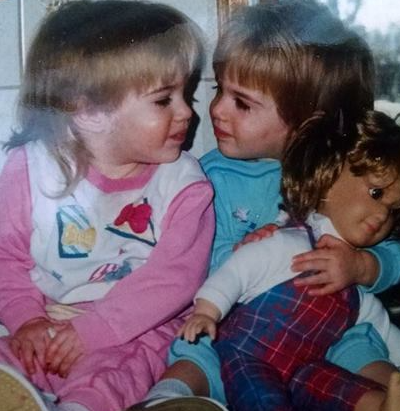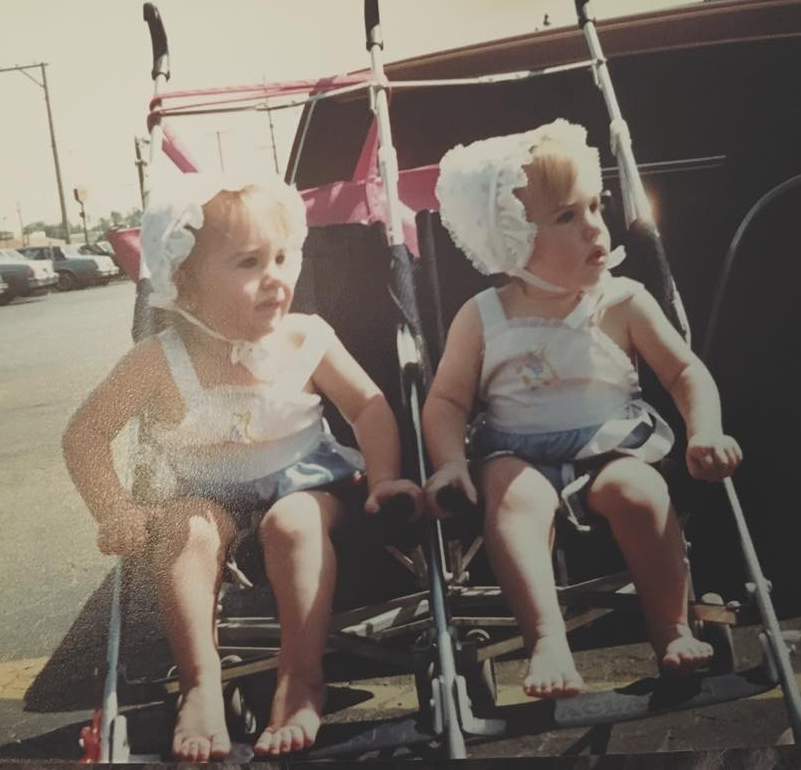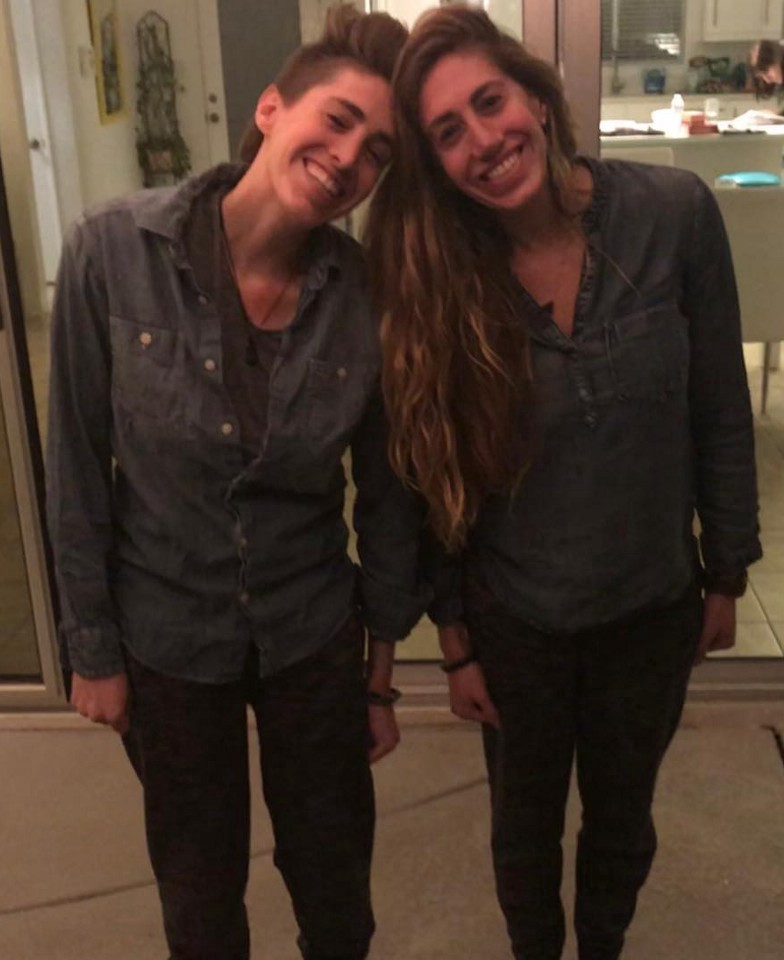
Having an identical twin gives you obvious life advantages. You can see what your haircut is going to look like before a single strand is snipped and get clothes delivered to you that have already been tried on. It’s a natural superpower to see your future self, but there are unexpected impacts of having a copy of yourself out there whom many people don’t know exist that makes you think twice about what it means to be unique.

One time, as a child, I actually talked to myself in the mirror, thinking it was my sister. I remember being in a department store with my mom and playing with clothing hangers. All of a sudden, my twin appeared out of nowhere. Surprised to see her, I whispered loudly, “I didn’t know you were here?!” Right as I was finishing the sentence, I realized her mouth was moving with mine. I looked around in a frantic state, feeling deeply embarrassed and desperately hoping that no one had witnessed this baffling scene of mistaken identity in front of a clothing-store mirror.
What happens when you can’t point to yourself in a photograph?
This realization that I had confused my reflection with someone whom I knew gave me another lens from which to look at life, causing us to see ourselves as extensions of each other. It allowed me to view my environment from another vantage point, as if we were different versions of one another playing out different lives. With a biological doppelgänger walking around, you also face unforeseeable and peculiar problems. What happens when you can’t point to yourself in a photograph? I would look at pictures and see someone who looked like me and then another person who also looked like me — I could put myself in both bodies.
As we evolved, we had an unexplainable echo effect on one another, our lives unfolding with strangely striking similarities. I spent my life observing this extraordinary happenstance from a participatory perspective and can trace it back to the beginning, even before birth.
What happens when the only space you have is inches from another person for nine months and you’re not allowed to leave the womb? Having a wombmate undoubtedly impacts you. Imagine being in a space where, if someone moves left, you have to move right. This womb became the first environment that we both embodied; you could say that I was basically born in the sharing economy.
Mirror-image identical twins are a rare form of twins that has some interesting characteristics: I’m a righty; she’s a lefty. When I lost a tooth on one side, one of hers fell out on the opposite side.
Our mysterious parallels have a basis in science reinforced by mirror neurons, a group of nerve cells that are activated when you witness an experience as though you are experiencing it yourself. Mirror neurons are what enable children to learn through imitation, but it’s also why people unconsciously copy each other’s body language. Mirror neurons allow us to feel what others are feeling and live their emotions, which is also considered to be the foundation of empathy. Many people have asked me whether we have ESP. I believe it’s not that we have extrasensory perception; it’s that we have an extreme form of empathy by being able to truly feel the other person’s emotions — like when I broke my nose and, immediately when she saw me, she started to cry.
It’s been theorized that we’re considered mirror-image identical twins. This type of twinning occurs when the single egg unexpectedly splits, turning us into two people later than it should, creating a mirrored reflection (any later, and we’d be stuck attached to each other as conjoined twins). Mirror-image identical twins are a rare form of twins that has some interesting characteristics: I’m a righty; she’s a lefty. When I lost a tooth on one side, one of hers fell out on the opposite side.
“Unique” by definition means one of a kind, unlike anything else. What if someone had been copying you since the day you were born… or technically 38 weeks prior to that? Call it a friendly competition, but it’s quite extreme to literally copy someone’s DNA code. This duplicate of mine disguised herself in the context of a spontaneous event, with the exact cause of this magical moment still being unknown. She gave me a two-minute head start to life, which I still have on her — as there are things that happened within those two minutes that she will never know about.

Between mirror neurons and matching outfits, remaining the same was easy — but being different was difficult. Even if I was barefoot wearing a bonnet, there she was sitting next to me in the same stroller seat in the replicated attire. I grew up without a first name for much of my childhood, with many friends hesitant to guess in case they got it wrong and mislabeling me as someone else. To be distinctive, I had to see what other people saw, which kicked off my career in research and cultivated a curiosity to understand human differences on a deeper level.
This information wasn’t difficult to obtain, as people can’t help but compare us, constantly noting their observations of two “identical” things. “You have a birthmark on your hand, and she has a dimple on her cheek.” While this endless game of “circle the differences” could easily feel like a redundant reminder of noticeable distinguishments, I used this unsolicited audience feedback to seamlessly jump into her life.

What do you do when it’s time to graduate college, and the ceremonies are scheduled to happen at the same time, on the same day, but in a different city from the one your identical twin is in? Instead of splitting up the family, we decided to combine the graduations — her name with my face. With the freedom to play each other as life’s greatest party trick, I accepted her diploma and fell to the ground to do the worm down the aisle. She sat in the audience, watching her graduation happen from a third-person perspective (while egging me on with crazy hand gestures). And they say you can’t be in two places at once.
What if your mirror reflection is walking in a different direction? I believe that people in the same environment impact each other on far greater levels than we’re aware of. My twinster tells me twins are what happens, “When two people in a past life were meant to be connected, they’re born into this life as twins.” And people tell me I’m the creative one. Being born with an identical twin gives you the ability to put yourself in another person’s body because you’ve been doing it your whole life. While I believe mirror neurons contribute to copycat-behavior patterns leading me to be an eccentric person, I credit them for the early activation of empathy by showing me how to put myself in another person’s shoes or bonnet. In a twin twisted way, you could say I wouldn’t be half the person I am today if it weren’t for her.








